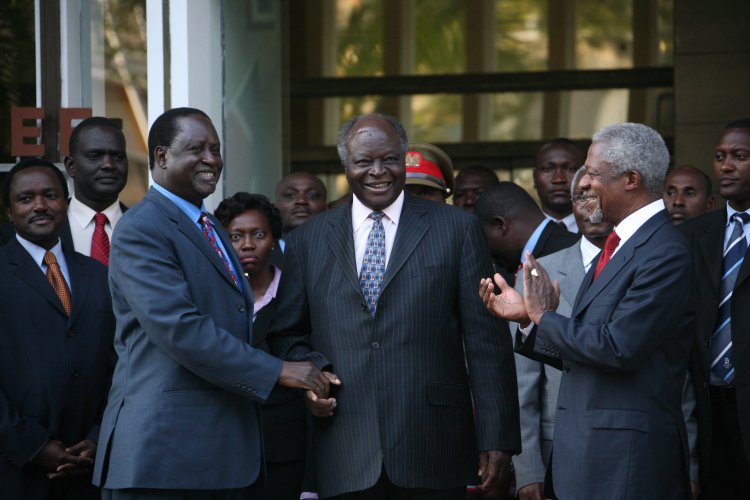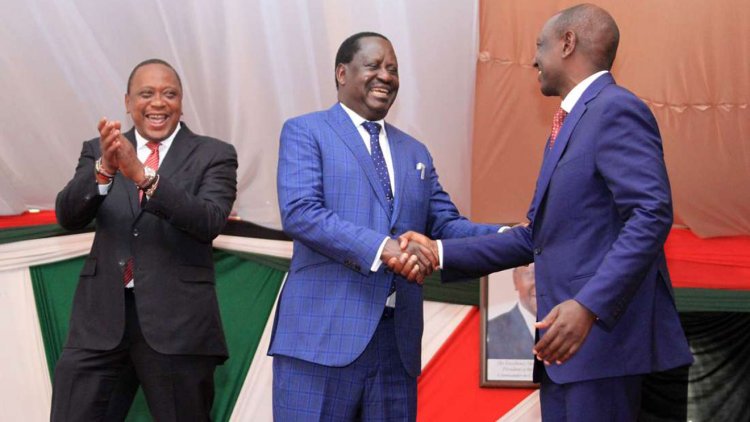2008 Power-Sharing Deal That Raila Wants To Revive With Ruto
His new demands are believed by many as his plan to resurrect a deal which he struck some 15 years ago...

Azimio la Umoja leader, Raila Odinga's new proposal for a truce with President William Ruto saw him push for the revival of a power-sharing demand that would sound to many Kenyans as 'de-ja-vu'.
Odinga on Tuesday, April 4 claimed that the parliamentary process, or bipartisan approach, may not serve the purpose intended by the coalition and instead suggested a conversation at the national level that resembled the 2008 agreement under the National Accord.
He noted that the purely Parliamentary process would not achieve the bi-partisan agreement arrived at by the two parties, even though Azimio already formulated a committee constituting of 14 members who would make the decision and take it to Parliament for approval.
His new demands are believed by many as his plan to resurrect a deal which he struck some 15 years ago with the late former President Mwai Kibaki which got him a real taste of top power as the country's Prime Minister.

The National Accord and Reconciliation Act of 2008 is an act of the National Assembly of Kenya that temporarily re-established the offices of the Prime Minister of Kenya, along with the creation of two deputy prime ministers.
This act followed the February 28, 2008, power-sharing agreement between Kibaki and Raila, who became the first prime minister of Kenya since 1964, when the constitution of the newly created Republic abolished the office. In simple terms, the Act allowed the bypassing of the Constitution to pave way for the formation of a grand coalition government.
The agreement was necessitated by the 2007/08 post-election violence in which over 1,000 people died and hundreds of thousands of others were injured and displaced. Under the Accord signed by Kibaki and Odinga, the leaders agreed on a power-sharing structure where they would equally divide the Cabinet and other key positions.
“The enactment of the National Accord and Reconciliation Act, 2008 and the agreement on the Cabinet underscores the commitment of our nation’s leadership to put the collective interest of the country and our people above everything else,” Kibaki said at the time.
The Prime Minister, while being appointed by the President without the need for prior consultation, had a distinct portfolio and coordinated the reform agenda as well as supervised ministries. The PM was also accountable to the President and was immune from civil or criminal prosecution.
Like in most other parliamentary democracies, the prime minister's government was dependent upon the party majority or power-sharing coalition majority in parliament. It would have fallen from power if or when the 10th Kenyan Parliament is dissolved, the coalition members agree in writing, or one coalition member withdraws from the coalition by resolution of the member's party's decision-making body.
The Constitution of Kenya, enacted in August 2010, provided for the extension of the power-sharing government to the end of its natural term. The Prime Minister had the potential of being dismissed from office by a majority vote of the Parliament.
On June 18, 2021, while mourning the late businessman Chris Kirubi, Raila hailed him as a key mobilizer in ending the 2007/2008 post-election violence leading to the formation of a grand coalition government. Alongside Kalonzo Musyoka, Raila explained that Kirubi convinced them to join the grand coalition government which was formed in the aftermath of the post-electoral crisis which claimed thousands of lives with many others displaced.
“The issue of forming a grand coalition and sharing positions in the new government almost caused a stalemate. Two people who came to approach me to agree on a compromise included Chris Kirubi, he pleaded with me to agree to have a dialogue with Kibaki, he was passionate and I agreed,” he said.
The agreement that paved way for the unveiling of the Grand Coalition Cabinet was reached during talks between the two principals at the secluded Sagana State Lodge.
“We managed to come up with a compromised agreement and a grand coalition was formed, thanks to the effort of Chris Kirubi,” Odinga added.
The National Accord rendered the country ungovernable unless a real power-sharing deal was struck because the events after the election threatened the country's existence. In the preamble of the agreement, the then-ruling party's power was limited especially when appointing and firing government officials as all processes needed to go through consultation.
This would therefore explain why some Kenya Kwanza leaders were up in arms over the new proposal, with Defence Cabinet Secretary Aden Duale accusing him of trying to bulldoze his way into power.

"Raila is an exposed man desperate for power at whatever cost. How does he equate the current situation to the 2007/08 period and ask for power-sharing under a National Accord arrangement?
"Your demos have nothing to do with the cost of living but a means to bulldoze your way to power. Trust me you will not succeed," Duale remarked.
Others who joined Duale in opposing Raila included Kimilili Member of Parliament (MP) Didmas Barasa, Nandi Senator Samson Cherargei, Kericho Senator Aaron Cheruiyot, Nakuru Governor Susan Kihika and lawyer Miguna Miguna.

 admin
admin 




